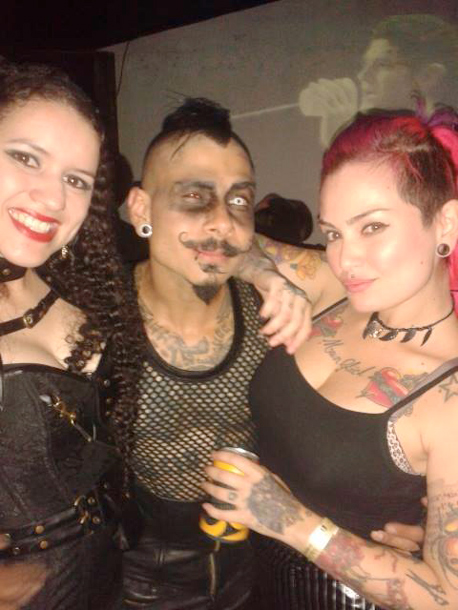While the the industrial music scene gains traction in Bogota, Oli Pritchard catches up with Colombia’s king of the genre, BlackAngel
It’s coming up to midnight and I’m surrounded by vampires and cybermen in an industrial rave party in Chapinero. This is a night of leather, latex and lust, not of jeans and hipster beard-stroking – it’s Colombia, but not as you might know it. To kick things off, Medieval Darkwave Electro are putting on just their second show ever in the capital – far removed from tropical sounds and floating melodies, this music is dark, gritty and cold. It’s characterised by brutally repetitive, crushing rhythms that lay aural waste to all in their path. There are no accordions here, just electronic noise terror.
The industrial music scene in Bogota has really grown in the last couple of years, mainly thanks to some excellent and dedicated organisers, but also through the efforts of local bands, some outrageous dressers and a rabidly loyal fanbase. King of the Colombian scene though is Medellin’s BlackAngel, who boasts an extraordinary career spanning three decades. The legend took some time out to talk to The Bogota Post before his gig on May 16 and reflect on old times.
“It all started back at university”, he explains. “One of my friends got me into this music, and we started making and circulating mixtapes. Although we were playing different music than most people, it was very successful.”
Of course, all of this had to be imported in the pre-internet (imagine!) days. He continues: “My cousin came back from New York with gifts of cassettes. There was also a guy who – somehow – got hold of LPs and later, CDs. Those were very important things back then, as we didn’t have a strong connection with the rest of the world where this music was so popular.”
It’s clearly been a long and interesting journey: “Now we have a new generation, some of whom follow my influence. I’m very honoured by that. Sometimes the old school guys complain, they think we play too much new music, not enough of the classics. That’s a very limited view, I think. Music moves on.”
He adds: “Of course, there are some bands, some songs that I’ll always play. Just because music changes it doesn’t mean Einstürzende Neubauten stop existing.”
I’m intrigued as to how the majority of Colombians see this subculture: “Colombia is becoming more open, more accepting. People understand now that being distinct is not being bad or evil.”
Several hours later and we reunite at the Loft Dayclub in Chapinero, just before his set is due to start at the witching hour. The vampiric cyborgs around me are in a state of ecstasy by now, hyped up by excellent local support Gia and Shun. He grins at me, clearly in his element, a dark prince in a sea of black leather, before striding up to the stage to lay his howitzer beats. He doesn’t disappoint, playing a storming set from start to finish which is lapped up by his adoring fans as enthusiastically as a pack of wolves mauling a baby caribou.
A great night, but more importantly a reminder why, at least for me, Bogota is such a great city: there are so many vibrant and flourishing subculture scenes, all of which are packed with youthful energy and enthusiasm.






